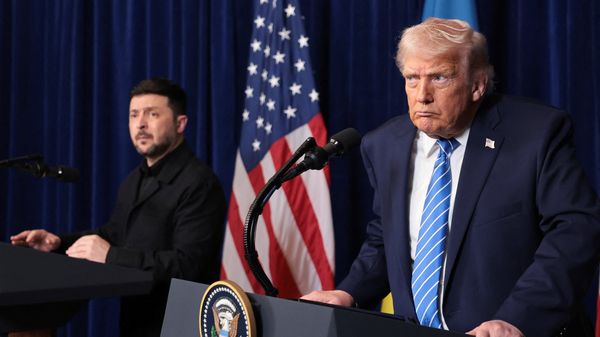Článek
The upcoming European Parliament elections and the presidential race in the United States are bringing the issue of migration back to the forefront. What are the biggest myths about migration? And how should we better think about migration so that we can manage it in the future?
Migration has been back in the news again in recent months. In the Czech Republic, the issue was debated in the context of the New Pact on Migration and Asylum, which was approved by EU members in February. In the end, Petr Fiala’s government decided not to support it. The pact was reportedly not ambitious enough for the Czech cabinet.
Refugees are also a hot topic in the United States as the country approaches a presidential election and the two rivals - Republican candidate Donald Trump and the current US president, Democrat Joe Biden - are at loggerheads over the issue.
Listen to the full interview with Hein de Haas for the 5:59 podcast in the English version:
But according to migration expert Hein de Haas, a sociologist and geographer, these debates are not based on real policy needs.
„It’s totally exaggerated. I mean, what you see in the migration debate is a sort of polarisation,” he says in the 5:59 podcast. Hein de Haas was a founding member of the International Migration Institute (IMI) at the University of Oxford and is currently a professor of sociology at the University of Amsterdam.
Politicians, the expert notes, are playing on people’s deep-rooted fear of foreigners, who in recent years have become „the most concrete manifestation” of the otherwise abstract phenomenon of globalisation. Migrants also embody the fear of the changes the world is undergoing.
According to de Haas, politicians then try to reinforce these fears in people. „The first reason is that they can portray themselves as strong leaders who are going to fight against the external enemy. (…) And the second reason is classic scapegoating. So if governments fail to provide people with adequate education, health care, housing, good incomes, it’s easy to distract the attention away and just say it’s the migrants who are costing them,” he says, explaining the motives behind this political strategy.

Hein de Haas, a sociologist and geographer, is a professor of sociology at the University of Amsterdam.
„Actually a fairly small share”
In their statements, politicians tend to describe migrants from the Global South as illegal aliens, adding that their numbers are increasing. And these arguments would seem to be supported by data from the International Organization for Migration (IOM), which shows that around 287,000 migrants entered Europe illegally last year. For this year, these statistics record almost 35,000 more such migrants by the end of March.
But we cannot look at such figures without taking a broader context into account, argues de Haas. He believes that a much more representative statistic is the long-term estimate that says that around 100,000 illegal migrants arrive in Europe every year.
The Dutch expert acknowledges that the number is still rather high, but he adds that it is a very small percentage compared to the overall data on migration. Hein de Haas points out that around 2,5 million people enter Europe legally every year, which makes it clear that the vast majority of migrants come in compliance with migration rules and laws.
„To give you one more concrete example: 9 out of 10 Africans who move to Europe do so legally. So we have this image - because we are confronted with images of boats and people crossing the border illegally - that migration, for example from Africa to Europe, is predominantly about illegal migration. Now, it's actually a fairly small share,” professor de Haas notes.
How much did the events of 2015 and 2016 and the crisis at the time contribute to making migration a hot topic? And what can be done, according to a Dutch expert, to improve the current situation? Listen to the audio in the middle of the article.
Sound design: David Kaiser
Hudba: Martin Hůla
Podcast 5:59
Zpravodajský podcast Seznam Zpráv. Jedno zásadní téma každý všední den za minutu šest. To nejdůležitější dění v Česku, ve světě, politice, ekonomice, sportu i kultuře optikou Seznam Zpráv.
Poslouchejte na Podcasty.cz, Spotify, Apple Podcasts a dalších podcastových aplikacích. Sledujte nás na X, Instagramu, Threads nebo Bluesky.
Archiv všech dílů najdete na našich stránkách. Své postřehy, připomínky nebo tipy nám pište prostřednictvím sociálních sítí nebo na e-mail: zaminutusest@sz.cz.














